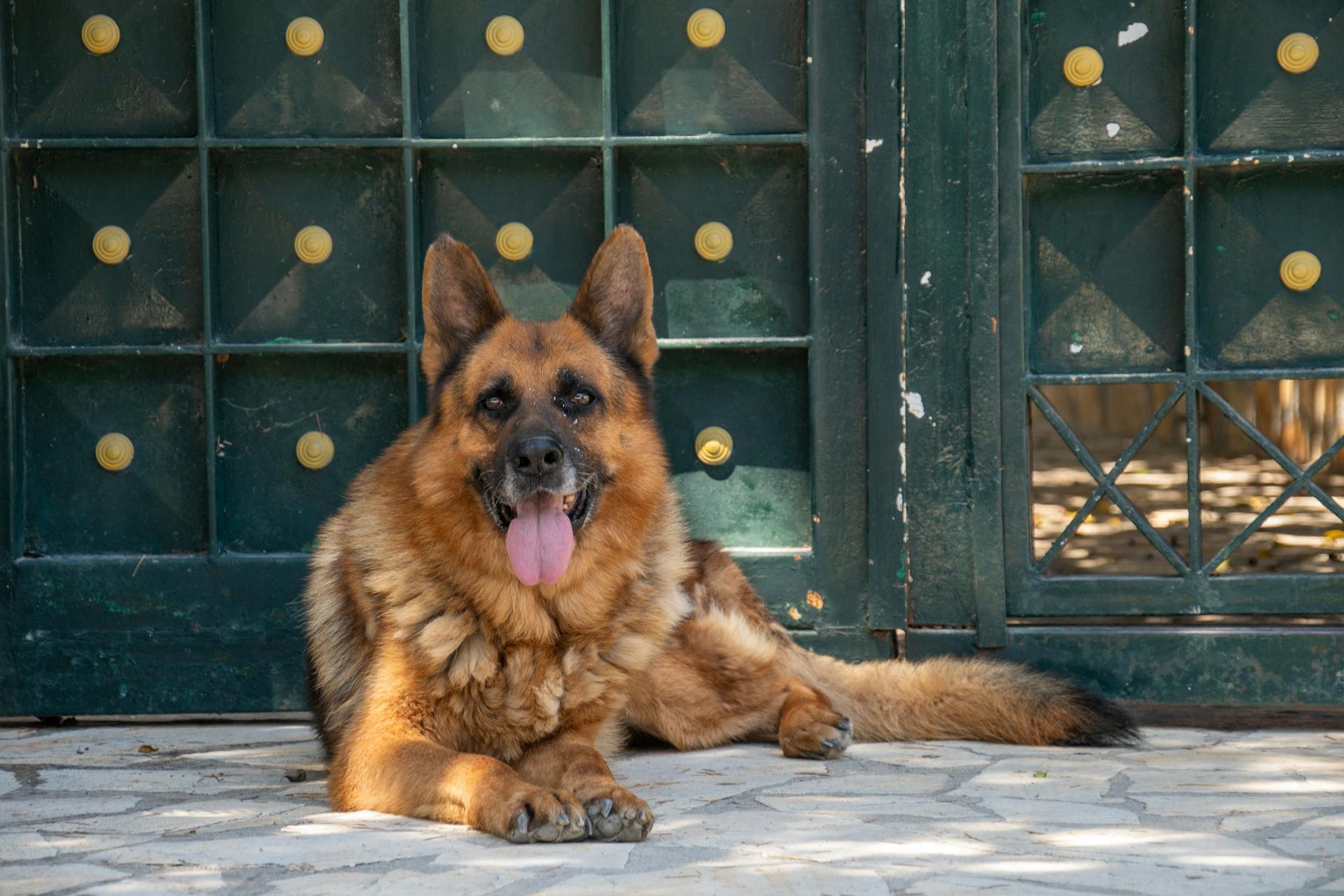
German Shepherds are a popular breed for many reasons, one of which is their litter size. On average, a German Shepherd litter size is 8 puppies, which can range from 1 to 12 puppies.
Their litter size is influenced by factors such as genetics, nutrition, and health of the mother. A healthy mother German Shepherd can produce a larger litter, while a litter size of 1 or 2 may indicate a potential health issue.
It's essential to note that a litter size of 8 is considered average, and some German Shepherds may have larger or smaller litters.
Factors Affecting Litter Size
Factors affecting litter size in German Shepherds are complex and multifaceted. The age of the mother is a significant factor, with younger dogs generally having smaller litters than older ones.
A healthy mother is more likely to have a larger litter than one that is in poor health. Inbreeding can also impact litter size, increasing the likelihood of genetic defects and smaller litter sizes.
Genetics play a role in litter size, with larger dogs tending to have larger litters than smaller ones. However, individual variations can occur, and this is not always the case.
Artificial insemination can sometimes result in larger litters than natural breeding, but this is not always the case. The mother's diet is also crucial, with a high-protein diet helping to ensure healthy and strong puppies.
Here are some key factors to consider:
- Age of the mother: younger dogs have smaller litters
- Health of the mother: healthy mothers have larger litters
- Genetics: larger dogs have larger litters
- Artificial insemination: can result in larger litters
- Diet: high-protein diet helps ensure healthy puppies
A dog's overall health, including its nutritional state, can affect litter size. Healthier dogs with balanced diets often have larger litters. Size of previous litter can also be a factor, with dogs that have had large litters in the past likely to have large litters in the future.
The age of the dog is another important factor, with the most numerous births often occurring from the fourth heat onwards. Proper nurturing and feeding can also impact litter size, with well-fed dogs having larger litters.
For another approach, see: Breeds of Sheep Herding Dogs
Female dogs have only two fertile days, and breeding them at this stage can ensure greater litter numbers. The number of puppies depends on the number of mature eggs that emerge from the ovaries, the day of sexual intercourse, and the fertility of the male dog.
German Shepherds with pedigree tend to have fewer puppies than those without a pure lineage. Size and age of the dog also affect the number of puppies, with German Shepherds able to have up to 14 litters in their life until the age of 8 years.
Check this out: Black and White Herding Dog Breeds
Understanding German Shepherd Litters
German Shepherds can have litters ranging from one to 17 puppies, but the average litter size is between five and eight. Several factors influence litter size, including genetics, age, health, and individual variations.
A young female German Shepherd may have a smaller litter size than an older female, and the size of the litter may vary depending on the size and health of the parents. Proper care and attention to both the mother and puppies during the gestation period and after birth are essential.
Curious to learn more? Check out: Female German Shepherds
Here are some key factors that can affect litter size:
- The age of the dog: the most numerous births often occur from the fourth heat onwards.
- The dog's general health.
- When the dog is bred: breeding them at the right time can ensure greater litter numbers.
German Shepherds with pedigree tend to have fewer puppies than those that do not have such a pure lineage or care.
Understanding
German Shepherds can have litters ranging from one to 17 puppies. The average litter size is between five and eight puppies.
Genetics play a significant role in determining litter size, with individual variations affecting the outcome. A young female German Shepherd may have a smaller litter size than an older female.
The size and health of the parents can also influence litter size. Larger litters can pose some challenges, such as increased competition for resources and higher risk of complications during birth.
Smaller litters can be easier to manage and may result in healthier and more robust puppies. Providing proper care and attention to the mother and puppies during and after birth is essential.
Breed and Characteristics
As you consider bringing home a new German Shepherd, it's essential to understand the typical litter size you can expect. A German shepherd can typically have between 5 to 9 puppies in a litter.
The size of the litter can also be influenced by the mother's breed, with larger breeds often having larger litters. For example, a golden retriever can typically have between 6 to 8 puppies in a litter.
Labradors, on the other hand, tend to have a smaller litter on their first time breeding, with the number of puppies typically ranging from 5 to 8. This is something to keep in mind if you're planning to breed your German Shepherd.
The health and well-being of both the mother and puppies can also be affected by the size of the litter, so it's crucial to work with a reputable breeder who can provide the necessary care and attention.
Health Considerations
Infections can affect the reproductive system of a German Shepherd, leading to a smaller litter size.
The age of the dog can also impact the size of the litter, as their reproductive system may not function as well as they get older.
Genetics play a significant role in litter size, with some German Shepherds having larger litters of ten to twelve puppies, while others may have smaller litters of two to four puppies.
Inbreeding can lead to smaller litter sizes and health issues in puppies, making it essential to avoid inbreeding and choose a reputable breeder.
To ensure a healthy litter, it's crucial to provide the mother dog with a nutritious diet, regular exercise, and proper veterinary care during pregnancy.
Monitor the mother dog for any signs of complications during pregnancy, such as difficulty breathing, lethargy, or loss of appetite.
A healthy mother dog is more likely to have a successful pregnancy and give birth to a litter of healthy puppies.
See what others are reading: Herding Dog Types
How Many Puppies Do German Shepherds Have?
German Shepherds usually have large litters due to their large breed size, which gives them more space to store the puppies and allows their ovaries to produce more eggs.
A German Shepherd with no pedigree lineage typically has between 7 and 9 puppies, while those with pedigree lineage often have between 4 and 6 puppies.
Many factors can interfere with the formula, so it's not a standard number, and some bitches may have more or fewer puppies than indicated.
Small Dogs vs. Large Dogs: Bigger Pups?
It's a common misconception that larger dog breeds always have bigger litters. Size can be a factor, but genetics, health, and other factors also strongly influence litter size.
Larger dog breeds don't always have bigger litters. In fact, some small dog breeds can have bigger litters than larger breeds.
A litter size of 12 puppies is not uncommon in small dog breeds like the Chihuahua. This is a notable exception to the general rule that larger breeds have bigger litters.
While size is a factor, genetics play a much bigger role in determining litter size. A dog's genetic makeup can influence how many puppies they have in a litter.
You might enjoy: What Are the 5 Types of German Shepherds

Litter size can vary greatly even within the same breed. For example, a German Shepherd's litter size can range from 1 to 12 puppies.
A healthy mother dog is more likely to have a bigger litter. Factors like age, nutrition, and overall health can all impact litter size.
In some cases, larger breeds can have smaller litters due to health issues or genetic factors. This highlights the importance of considering multiple factors when assessing litter size.
Sources
- https://blog.tryfi.com/how-many-puppies-can-a-german-shepherd-have/
- https://animals.onehowto.com/article/how-many-puppies-can-a-german-shepherd-have-in-one-litter-9984.html
- https://www.hepper.com/puppies-in-german-shepherd-litter/
- https://topshepherd.com/blog/how-many-puppies-do-german-shepherds-have-in-their-first-litter/
- https://basepaws.com/dog-insider/how-many-puppies-can-a-dog-have-understanding-dog-litter-sizes
Featured Images: pexels.com


